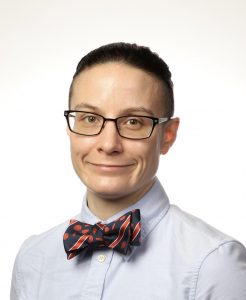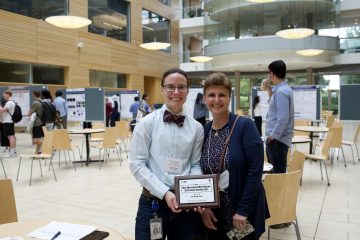
Dr. Gary Cole.
Dr. Gary Cole is a Postdoctoral Research Fellow in the Karsan Lab. Gary is researching which factors promote blood cell formation during development so that protocols around stem cell transplant and the need for donors can be improved. Gary completed their PhD in Northern Ireland and moved to Vancouver after completing their graduate studies. Outside the lab, Gary is an avid rugby fan and loves exercising! They also enjoy reading, and playing with their cats, Zeus and Apollo.
We were able to interview Gary and learn more about their mentorship journey and what receiving this award means to them.
How did you feel when you found out that you received the award?

Dr. Gary Cole holding the award plaque with Dr. Parvin Bolourani.
I was so overwhelmed when I heard the news. I have always enjoyed teaching and supporting students and lab mates. It was such a great feeling to know that my colleagues see and value that. The Neil Mackenzie Award is very special and meaningful, and even being nominated is a huge compliment. I would like to thank my team for taking the time to nominate me and to acknowledge that aspect of my work. Considering how many excellent mentors we have at CBR, winning was very unexpected and I am really proud to be a recipient.
What qualities do you think are important for anyone in a mentor position?
Although I think all mentor-mentee relationships look different, these are some of the qualities that I try to bring to my mentorship:
- Making time: I think that this is one of the most important qualities for being a successful mentor. Depending on the stage that your mentee is at, they may need a lot of time and patience, especially at an early stage of their career. If you dedicate time for the relationship initially, it will allow you to set expectations, understand their goals, and reflect on where they need support. Checking in regularly to give feedback and to see how they feel things are going is key.
- Establishing good communication: Being approachable and encouraging your student to communicate with you if they have issues will help their (and your) development a lot. When I start working with a new student I try to let them know early on how much time they can expect to spend with me, what I hope to see, and how that might change as they become more independent. Part of that is encouraging them to ask questions when they are unsure of something and letting them know when a good time is to approach me with any issues they are having. I also let them know that making mistakes is a normal part of the learning process and that they can come to me if they think something has gone wrong so that we can figure it out together.
- Being adaptable: Even if you don’t realize it, you have a communication and mentorship style, and because everyone is different, your natural approach will be more compatible with some people than others. It is important to reflect on what works well for your mentee and to be able to adjust accordingly. This could involve making changes to how you communicate and asking for their feedback.

Gary’s two cats, Zeus & Apollo.
What’s the most rewarding part of mentorship?
For me the most rewarding part of mentorship is seeing growth in the people you are working with. Seeing students gaining confidence and applying the knowledge that they have acquired during their time with us makes me feel like I have really contributed to their development.
What’s your biggest challenge as a mentor?
I want to give students enough information, context and training that they understand what they are doing. On the other hand, I don’t want to deny them the chance to learn things independently or work things out for themselves. I can find it challenging to strike this balance and am still learning how to give students the right level of input and support. I want to make sure that I am providing them enough guidance while also giving them the opportunity for personal growth and developing their trouble shooting skills.
Tell me about a few mentors who have greatly influenced your own scientific journey.
For my undergrad, I studied Pharmacy but struggled a lot. I felt like I didn’t fit in well in an environment that was quite conservative and normative. I also had a hard time connecting with classmates and lecturers which made me struggle to see a future for myself in the profession. Now I know that this was at least in part because I did not see myself represented in the faculty or staff who led our placements. I am really grateful to Prof Brendan Gilmore who gave me my first experiences in research, which was a much better fit for me. His mentorship was hugely influential for me as he saw my potential and encouraged me to apply for graduate studies. I am also grateful to my PhD supervisor, Prof Helen McCarthy, who, I hope she won’t mind me saying so, was pretty non-normative herself. The environment she created allowed me to be myself and developed me into an independent thinker. My current supervisor, Prof Aly Karsan, has also has helped me develop a lot during my time in the lab.
What are your parting words on mentorship?
I think it’s important to realize that while a lot of mentoring will be through formal activities like supervising students, you will also do a lot of informal mentoring. Sometimes, you may not even realise that some people consider you a mentor. What I mean by this is, academia is a very collaborative environment and we are all learning from and teaching each other. The people around you, especially those junior to you, are always learning from you and your example. How you interact with people, the time you take to share your expertise or offer your feedback and support can set the standard for the environment and be very influential to those around you.
Gary would also like to extend thanks to all the past students that helped develop their mentoring skills. They also thank their lab mates, past and present, especially the senior grad students and postdocs who took the time to pass their knowledge and skills over. Lastly, Gary said they wouldn’t be here if it wasn’t for organizations who funded their education including Prostate Cancer UK, the UK’s Medical Research Council, and Health Research BC.


